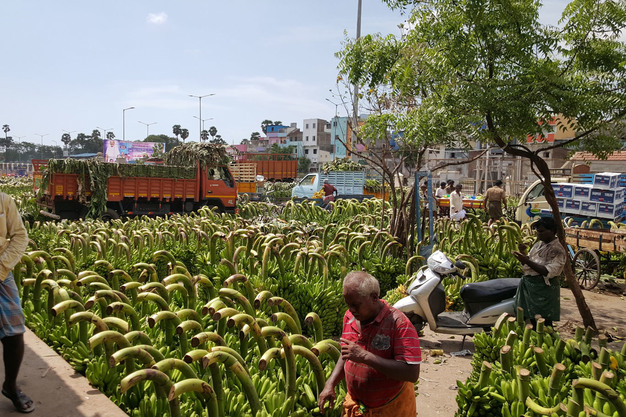Why should banana prices actually be higher in stores? Why will it be years before other African countries will take Central and South America by storm in exports? Why is there no TR4-resistant variety yet? And why are reefer ships suddenly in demand again? Frits Popma answers all these questions here.
Frits founded Popma Fruit Expertise in 2021. This Dutch consulting firm specializes in tropical fruit ripening.
 A banana market in Chewnna India
A banana market in Chewnna India
"If you want something, you must pay for it"
Frits believes retail banana prices are too low. "Growers and suppliers have to meet a laundry list of requirements, for which they must also present the necessary certifications. That's often justified - environmental and social justice are important issues - but then pay for it. And that doesn't happen. You can no longer buy a crate for under €15, but the minimum price in Ecuador for 20 kilos of green bananas is still only €6.85. Things like the cardboard, plastic, transport, and import duties comprise that eight euro difference," he begins.
Container shipping
Ecuador and other South and Central American countries keep dominating the European banana market. not only because of smooth logistics but also, as Frits aptly puts it, "a child born in Ecuador or Costa Rica thinks bananas." The expertise gained over decades gives the continent a huge advantage over competitors in Asia and Africa.
Logistics, though, have been somewhat of an issue recently due to the dry Panama Canal, and there is an ever-louder call for true banana ships. "Only Seatrade still offers reefer ships, and Chiquita and Dole are among the few with their own. The rest of the exports go into container ships that call at multiple ports and are, therefore, slower. The fastest container freight from Ecuador to Rotterdam takes 17 days," says Frits.
"There's another problem for South American exporters and European importers that shouldn't be underestimated: drug smuggling. Even for growers, it often becomes more interesting to plant cocaine instead of bananas. And, in Europe, most importers and ripeners have had to call the police because they've come across a batch of cocaine while unloading bananas."
India is an emerging country
Frits considers India an emerging banana export country. Also because in early January, he visited several ripening facilities in Saudi Arabia, a country that imports Indian bananas. "In the Middle East, however, ripening systems limp far behind. Ripeners working for supermarkets are told that one day is enough, while in Europe, the standard is six days. That guarantees a longer shelf life and, so, less wastage," Popma explains.
"In India itself - the world's largest banana producer, by the way - there's still plenty of ground to gain, cultivation-wise. Almost all their bananas are destined for the local market, but 30-40% of the crop invariably ends up in the landfill. That's awful when you know that out of 1.4 billion inhabitants, 300 million are unnecessarily starving."
Testing TR4-resistant varieties
In the Philippines and South America, especially Peru, the TR4 fungal infection is causing substantial crop losses. In the Philippines, they are reportedly currently testing a resistant variety. Frits: "That's promising news, but some questions naturally remain. Can they keep on a ship for a month? How do they ripen? How do they taste?"
Frits does not know if there are more new resistant varieties in the works. "All the big firms are trying to find a solution, but not everyone's being upfront about it. Everyone's doing it on their own. That's a shame. It would be better to do the research efforts collectively because banana production's continuity is important for the whole world."
Red and blue bananas: still niche products
Is there room for specialties? Frits thinks so, for red bananas, now a small item, maybe one container per week for the whole of Europe. Blue bananas, in turn, are a real treat with their exceptional flavor. "India has particularly vast banana varieties, which, given the diaspora, also in Europe, have great export potential," he explains.
High-tech quality control is a must
The banana expert also makes a case for the new quality control methods developed in the Netherlands. "Some companies focus on big data-based quality control of the entire banana and tropical fruit supply chain. For example, non-destructive methods can nicely map the fruit's internal quality. Still, it seems to take a long time for those techniques to be accepted."
"Is it the price? Is it reluctance? Do companies not have the right people running their warehouses? I'm just guessing," Frits admits. Yet, it is becoming imperative that banana sector companies embrace the innovative techniques because, he says, "As a banana expert, I have plenty of work but very little competition in the industry. But what if I slow down later?"
That is not happening anytime soon, though. Frits is, for instance, going to Tanzania next month to guide their banana chain. "Along with a company, I'll explore the export possibilities. There's still a long road ahead, though. The quality has to improve and volumes are still limited. The target market is the Middle East, because of its proximity and because you need fewer certificates than in Europe. If the situation in Sudan stabilizes, it, as a Muslim country, would also have many export opportunities to Saudi Arabia," concludes the 70-year-old, who is still brimming with energy and ideas.
Popma Fruit Expertise
Frits Popma
M: 0031 (0)651 188 669
[email protected]
